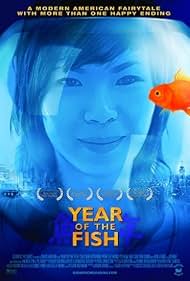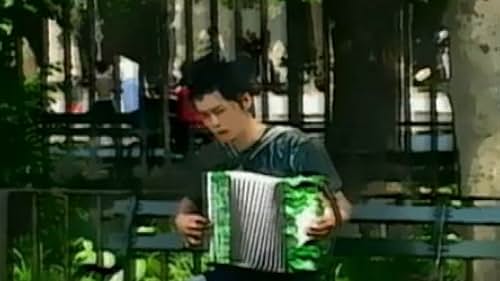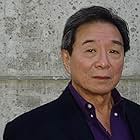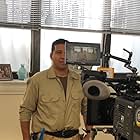A rotoscope-animated modern-day Cinderella story set in the underbelly of New York's Chinatown.A rotoscope-animated modern-day Cinderella story set in the underbelly of New York's Chinatown.A rotoscope-animated modern-day Cinderella story set in the underbelly of New York's Chinatown.
- Awards
- 1 win & 2 nominations
Photos
Henry Russell Bergstein
- Hasidic Customer
- (as Henry Russell)
- Director
- Writer
- All cast & crew
- Production, box office & more at IMDbPro
Storyline
Did you know
- SoundtracksFrantic Dances of the Golden Serpent
performed by Xiao-Peng Jiang & The Chinese Orchestra of Shanghai Conservatory
courtesy of Jingo Records
©2005
Featured review
It's hard to find where to start with this. I suppose the camera work is as good a place as any - And although uninspired, there aren't any major enough blunders to justify ripping into the film's photography. Although a lot of shots are longer than they should be, and there is a great deal of grating breaks in pacing, the camera can be safely ignore, as in most films. The so-called "rotoscoping," however, adds positively nothing to the content of the movie. No actual rotoscoping appears to take place; instead, something which greatly resembles an ugly Photoshop filter has been applied to the images, making the already low-budget (Not that there's anything wrong with that!) film appear tacky and cheap. While some moments use the "canvas" filter to good effect, it's never sufficiently explored to justify its inclusion. It appears to be there mostly so that the film can get away with lower production values and crude make-up.
The acting, although also marked by some entertaining moments, is mostly wooden. The main character wears a bewildered or frightened expression for the whole duration of the film; the relatively minor sub-plot of the main character's paramour and his relationship to his friends are actually where all the decent acting in the film is focused, and Ken Leung works hard to pull the movie out of the deep pit it manages to dig for itself. Some of the characters are downright stereotypical caricatures. The figure of Aunt Yaga is poorly, if at all, explained, and seems to just have been plucked out of Chinese mythology and dropped unceremoniously into the film. The character of An Nguyen, poorly dressed as her character requires, is inexplicably considered to be very attractive, even though that is clearly not the case.
All of that can be overcome by a film with a good story to tell - Unfortunately, Year of the Fish has got nothing. The plot unfolds by force, being pushed by a sort of on-going deus ex machina - Ye Xian, despite being the protagonist, has no agency in the film and very little initiative. All of the plot points are resolved by a single character whose motivation and origin are completely unclear. It's impossible for the audience to actually know why anything is happening; the story seems to be moved forward not by causality or by the motivation of the characters, but by some sort of overwhelming, invisible, fate-like entity trying to push the main character through adversity and then hand her happiness on a silver plate; again, the film comes off as incredibly cheap. While there is nothing wrong with the author's voice, or with the traditional structure of a fairy tale or an adventure, - obstacles followed by success - the film doesn't work to support its narrative structure.
Lots of little details in the movie are completely unnecessary, and seem to be there just to try and cram in some sort of arcane trivia from the original Chinese stories it is based on. Information is delivered via random appearances of a prophetic character. Narration is provided by a fish whose job in the plot is unclear. The film teeter-totters dangerously between fantasy and (in the mind of the author) gritty realism, and while some interesting situations can be glimpsed briefly just at the very border between these two worlds, the film never spends any time there; there is no descent, but rather, the main character flickers unwittingly between the world of fairy tale and real-life Chinatown, and the transition is never explored sufficiently to be interesting.
All in all, a transparently cheap attempt at exploiting the structure and feel of a fairy tale in order to extort some emotional reaction from the audience. It falls flat on its face both for failing to recognise what makes fairy tales wondrous, and for populating its world with antagonists that are too easy to hate, protagonists that are too difficult to like, and supporting characters which are little but the grinding wheels of the author's inevitably forced conclusion.
The acting, although also marked by some entertaining moments, is mostly wooden. The main character wears a bewildered or frightened expression for the whole duration of the film; the relatively minor sub-plot of the main character's paramour and his relationship to his friends are actually where all the decent acting in the film is focused, and Ken Leung works hard to pull the movie out of the deep pit it manages to dig for itself. Some of the characters are downright stereotypical caricatures. The figure of Aunt Yaga is poorly, if at all, explained, and seems to just have been plucked out of Chinese mythology and dropped unceremoniously into the film. The character of An Nguyen, poorly dressed as her character requires, is inexplicably considered to be very attractive, even though that is clearly not the case.
All of that can be overcome by a film with a good story to tell - Unfortunately, Year of the Fish has got nothing. The plot unfolds by force, being pushed by a sort of on-going deus ex machina - Ye Xian, despite being the protagonist, has no agency in the film and very little initiative. All of the plot points are resolved by a single character whose motivation and origin are completely unclear. It's impossible for the audience to actually know why anything is happening; the story seems to be moved forward not by causality or by the motivation of the characters, but by some sort of overwhelming, invisible, fate-like entity trying to push the main character through adversity and then hand her happiness on a silver plate; again, the film comes off as incredibly cheap. While there is nothing wrong with the author's voice, or with the traditional structure of a fairy tale or an adventure, - obstacles followed by success - the film doesn't work to support its narrative structure.
Lots of little details in the movie are completely unnecessary, and seem to be there just to try and cram in some sort of arcane trivia from the original Chinese stories it is based on. Information is delivered via random appearances of a prophetic character. Narration is provided by a fish whose job in the plot is unclear. The film teeter-totters dangerously between fantasy and (in the mind of the author) gritty realism, and while some interesting situations can be glimpsed briefly just at the very border between these two worlds, the film never spends any time there; there is no descent, but rather, the main character flickers unwittingly between the world of fairy tale and real-life Chinatown, and the transition is never explored sufficiently to be interesting.
All in all, a transparently cheap attempt at exploiting the structure and feel of a fairy tale in order to extort some emotional reaction from the audience. It falls flat on its face both for failing to recognise what makes fairy tales wondrous, and for populating its world with antagonists that are too easy to hate, protagonists that are too difficult to like, and supporting characters which are little but the grinding wheels of the author's inevitably forced conclusion.
- bruno-r-dias
- Oct 21, 2007
- Permalink
Details
- Runtime1 hour 36 minutes
- Color
- Sound mix
- Aspect ratio
- 1.85 : 1
Contribute to this page
Suggest an edit or add missing content















